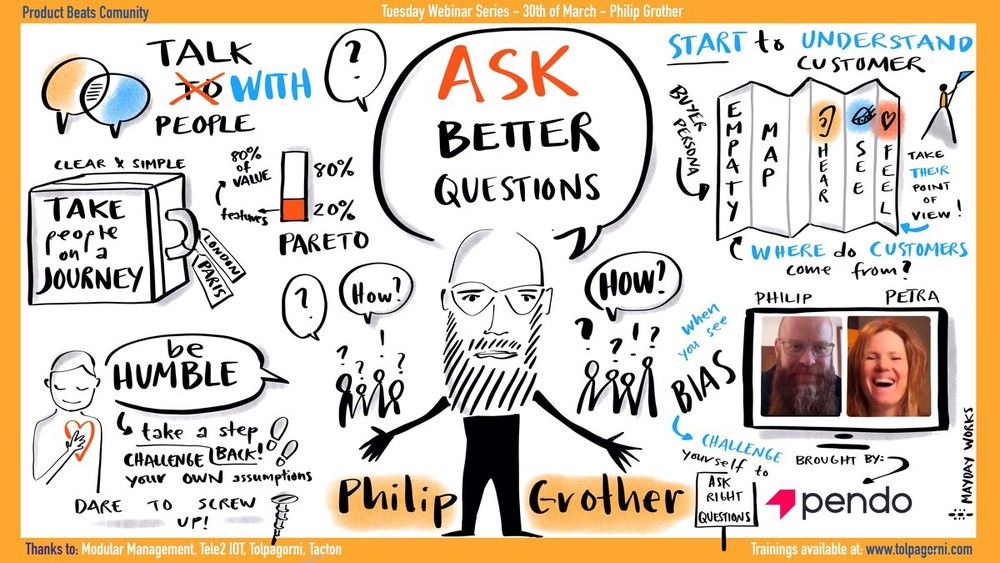Episode 51: Questions for Product Design w/Philip Grother
30 March, 2021 / Host: PETRA FÄRM
Unlocking Product Design Success
In the realm of product design, obtaining valuable insights and foresight is not an otherworldly endeavor but rather a result of asking the right questions and truly listening to the answers. To unlock the secrets of successful product development, we must open our minds and understand the context of others. The power lies in our ability to engage in meaningful conversations and glean insights that shape exceptional products. As product designers, we must constantly remind ourselves of the significance of empathy and understanding. Each person we interact with, whether in user interviews, usability testing, or customer feedback sessions, offers a unique perspective. Their thoughts and opinions are invaluable, providing us with the keys to unlock the doors of innovation.
In this article, we delve into the world of product design and explore the importance of asking better questions. Drawing inspiration from Philip Grother's insights shared in this episode of the Productbeats Show we uncover valuable strategies and techniques that can enhance your ability to understand customer needs and create innovative solutions.
Aligning Values for Success
A successful product not only meets the needs of external customers but also aligns with the goals and values of internal stakeholders. Understanding the value proposition from the perspective of external customers is crucial, but it is equally important to ensure that internal teams share this understanding. By fostering alignment and collaboration, organizations can create a seamless experience for customers and drive success.
The concept of a buyer persona, which represents the ideal customer for a product or service, can help us align values. Developing a deep understanding of the target audience is vital for asking better questions. By identifying and empathizing with the buyer persona, product designers can gain insights into their preferences, motivations, and pain points. This knowledge allows for more effective questioning and ultimately leads to the creation of products that resonate with the intended audience.
Embracing Empathy and Challenging Assumptions
To ensure successful product design, it is crucial to challenge assumptions within an organization. Conflicting assumptions can lead to misalignment and hinder progress. By encouraging open-mindedness and a willingness to question preconceived notions, teams can uncover hidden insights and align their perspectives. This process of unveiling unknowns helps in refining product strategies and enhancing overall customer experiences.
The Pareto Principle, also known as the 80/20 rule, can be applied to product design and customer value. It suggests that 20% of features or efforts typically provide 80% of the value. By identifying this vital 20%, companies can prioritize their resources and focus on the aspects that truly matter to customers. This knowledge empowers product designers to create streamlined, user-centric solutions that maximize customer satisfaction.
Known vs. Unknown
Acknowledging the gaps in knowledge and challenging assumptions is a fundamental aspect of successful product design. Organizations that embrace humility and curiosity foster an environment of continuous learning and improvement. By remaining open to new insights and possibilities, teams can discover innovative solutions and stay ahead of the competition.
Clear Messages and Incremental Building
When presenting a product to clients, it is essential to approach the pitch with detachment and consider the perspectives of both internal and external stakeholders. By asking open-ended questions and engaging in meaningful conversations, product designers can gather valuable feedback and ensure clarity in communication. This approach not only increases the chances of success but also fosters a collaborative environment that promotes creativity and innovation.
Clear and concise communication plays a vital role in product pitches. By conveying messages in a simple and straightforward manner, designers can engage clients and help them grasp the essence of the product. Storytelling techniques can be employed to take clients on a journey, building their understanding and excitement gradually. This incremental approach allows for a more compelling and persuasive pitch, increasing the likelihood of product acceptance and success.
Takeaways
- The importance of asking thoughtful and insightful questions in product design: Discover how asking the right questions can lead to a deeper understanding of customer needs, uncover hidden insights, and drive successful product development.
- Effective communication strategies for client and customer conversations: Learn techniques to enhance your communication skills, including active listening, empathy, and asking open-ended questions. These strategies will enable you to foster productive dialogues and build strong relationships with your clients and customers.
- Leveraging customer insights to deliver exceptional products: Explore how incorporating customer insights gained from asking better questions can fuel innovation and result in the creation of products that truly meet the needs and desires of your target audience. Use these insights to drive product development and deliver exceptional user experiences.
If you're eager to enhance your product management skills and take your career to new heights, consider joining The Productbeats Product Management Certification Program. This comprehensive program is designed to equip you with the knowledge and tools necessary to excel in the dynamic field of product management. With a focus on practical skills and industry best practices, this certification program will empower you to become a highly effective product manager. Whether you're a seasoned professional or just starting out, The Productbeats Program offers a transformative learning experience that will give you a competitive edge in the market.
You might also enjoy watching...
Copyright © 2026 ProductBeats AB

Get The Program Brochure
Submit the form below to have The Program Brochure delivered to your inbox
The title of the notification
The descriptive text of the notification


